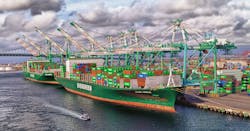Wall Street Is the Root Cause of the Supply Chain Crisis
Commentary
All Americans are by now well aware of the situation at the L.A. ports. Most have already experienced the fallout from this fiasco. Shortages are affecting just about every area of commerce and the lives of ordinary Americans. The full impact of this has likely not yet been experienced yet. How many small businesses will still be standing when the essential and long-delayed supplies finally reach them, months late?
The blame game has been in full swing, and there has no shortage of targets for those pointing the finger. It is easy to blame the ports, the drivers, the shipping companies, the logistics industry, and more. However if we wish to sincerely identify the root cause of the problem we are required to go back in time, back to the mid 1980s.
Just-in-Time Cherry-Picking
American OEMs were much impressed by the Japanese Toyota model and the efficiency of its supply chain. This allowed the Japanese to produce cars in the U.S. at similar costs to those produced in Japan, despite the higher labor costs. Of particular interest was Just in Time (JIT)—no inventory costs , warehousing or tied-up capital. What’s not to love?
It worked well enough, but never as well as when the Japanese used it. The essence of the Japanese model was the relationship with its suppliers. They regarded their supply chain as an ecosystem, rather than the predatory feudal system preferred in the Western model. Toyota’s suppliers had full line of sight and an open and honest relationship with their customer, and the model was local. Toyota preferred to use suppliers who were within 200 miles of their plant.
Rather than embrace the model in its entirety, U.S. automakers chose to cherry-pick the parts they liked, and shun those they didn’t. So JIT was great, but improving relationships with suppliers, not so much.
Then we come to the early 2000s, when OEMs decided that JIT wasn’t enough; now they wanted JIT with “China prices.” And there was the rub. The JIT model was secure because it was highly localized; any risks of disruption were minimal. But that qualification didn’t matter to the U.S.-based OEMs. They mostly pressured their suppliers to assume the risk for them and develop relationships with Chinese suppliers. Another burden, risk, had been outsourced to suppliers.
Financialization Is King
So who is to blame? The OEMs are not generally run by engineers or supply-chain specialists. They tend to be run by accountants and financiers. They work in a system that incentivizes all the wrong things. If a public company announces it is outsourcing to China, the stock goes up. Should it plan to reshore production, the stock goes down. If a company plans to invest in research and development, its stock is negatively impacted. JIT was good for stock prices, but it was bad for American industry.
Dealing with the symptoms of the current problems won’t solve anything. We do indeed need to identify a culprit for the current supply chain woes, but don’t blame the drivers or the port workers. Blame Wall Street and the financialization of just about every aspect of American life. It is why there is no Industrial policy, and as long as that remains so, there will never be a solution to America’s crumbling infrastructure.
There is no immediate answer to the core problem. The system is working fine for those who designed it and continue to profit from it. Unfortunately, as many Americans are beginning to understand, the current system doesn’t take their welfare into account.
Eamon McKinney, Ph.D., M.B.A., (sinologist) is an expert on China-related business issues in the world. He has contributed numerous articles on the subject to publications including the Financial Times, the Economist and the Far Eastern Economic Review.
